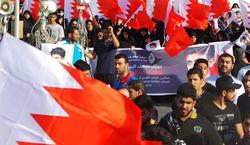 As Bahraini people gear up to mark the eighth anniversary of their uprising against the ruling Al Khalifah regime on February 14, the country’s main Shia opposition group, the al-Wefaq National Islamic Society, has reaffirmed its determination to continue peaceful rallies until its demands for political reforms are met.
As Bahraini people gear up to mark the eighth anniversary of their uprising against the ruling Al Khalifah regime on February 14, the country’s main Shia opposition group, the al-Wefaq National Islamic Society, has reaffirmed its determination to continue peaceful rallies until its demands for political reforms are met. RNA - Al-Wefaq, which has been dissolved and banned from conducting any activity by the Al Khalifah rulers, said in a statement on Tuesday that Bahrainis have increasingly witnessed Manama’s “corruption, tyranny and recklessness” over the years, Bahrain’s Lulu TV reported.
Al-Wefaq described the country’s deteriorating situation as “frightening,” and warned of a bleak future.
Eight years on, the Bahraini movement is still sticking to its demands for political reforms, and is resolved to keep up its struggle for change, it added.
Since February 14, peaceful protest rallies have been held regularly, demanding that the Al Khalifah family relinquish power and let a just system representing all Bahrainis be established.
The protesters have also been complaining against widespread discrimination against the Shia majority in the kingdom.
Eight Years On: Al-Wefaq Is Sticking To Demands Ahead Of Uprising Anniversaryhttps://t.co/mOGOba2IBJ#Bahrain #Manama pic.twitter.com/vgTgKvMyA0
— LuaLuaTV (@LuaLuaEnglish) February 4, 2019
Manama has responded to the protests with lethal force, drawing international criticism. In March 2011, troops from Saudi Arabia and the United Arab Emirates were also deployed to assist Bahrain in its crackdown.
Bahraini authorities have also detained human rights campaigners, broken up major opposition political parties and revoked the nationality of several activists.
Since the start of the popular protests, the Manama regime has dissolved key opposition factions, including al-Wefaq and the National Democratic Action Society (Wa’ad), arrested prominent opposition figures and rights activists, and conducted mass trials of civilians at military courts.
Rights activists have lashed out at Manama for the rampant torture and sexual abuse of political prisoners as well as numerous death sentences, lengthy jail terms, revocation of citizenships, enforced deportations and hefty financial penalties against political activists and Shia scholars in the country.
Critics argue that defendants in the mass trials, all Shia Muslims, are victims of torture and denied access to any legal representation during the investigation period.
Human Rights Watch and Amnesty International have repeatedly expressed deep concern over the deterioration of human rights in Bahrain, saying the situation reveals the regime’s campaign to silence voices of dissent in the sheikhdom.
Sheikh Qassim’s words ‘road map for future’
Meanwhile, Bahrain’s top religious scholars have welcomed last week’s statement by Bahrain’s top Shia cleric Sheikh Isa Qassim, describing it as a “road map” for the country and its future.
In the statement issued last Friday, the senior cleric hailed Bahraini people’s relentless struggle for “rights, justice and freedom.”
Bahraini scholars said in a statement on Monday that they had received “with great passion and eagerness” Sheikh Qassim’s words that contained a “map, a strategy, foundations…and a signal.”
They also called on the people of Bahrain to be fully prepared to mark the anniversary of the uprising.
According to Press TV, Bahraini authorities stripped the cleric of his citizenship on June 20, 2016. They later dissolved the Islamic Enlightenment Institution founded by Sheikh Qassim as well as the opposition al-Risala Islamic Association.
On May 21 last year, a Bahraini court convicted Sheikh Qassim of illegal collection of funds and money laundering, and sentenced him to one year in jail suspended for three years. It also ordered him to pay $265,266 in fines in a ruling which sparked widespread demonstrations across the kingdom.
Under house arrest since May 2017, the Bahraini cleric was flown to Britain in July 2018 for medical treatment.
Bahrain Foreign Minister Khalid Al Khalifah wrote on Twitter at the time that King Hamad bin Isa Al Khalifah had allowed Sheikh Isa Qassim to travel to the United Kingdom for medical care.
Sheikh Qassim – who holds a one-year passport -- is currently on a visit to the holy Iranian city of Mashhad after visiting the holy Iraqi city of Najaf.
847/940